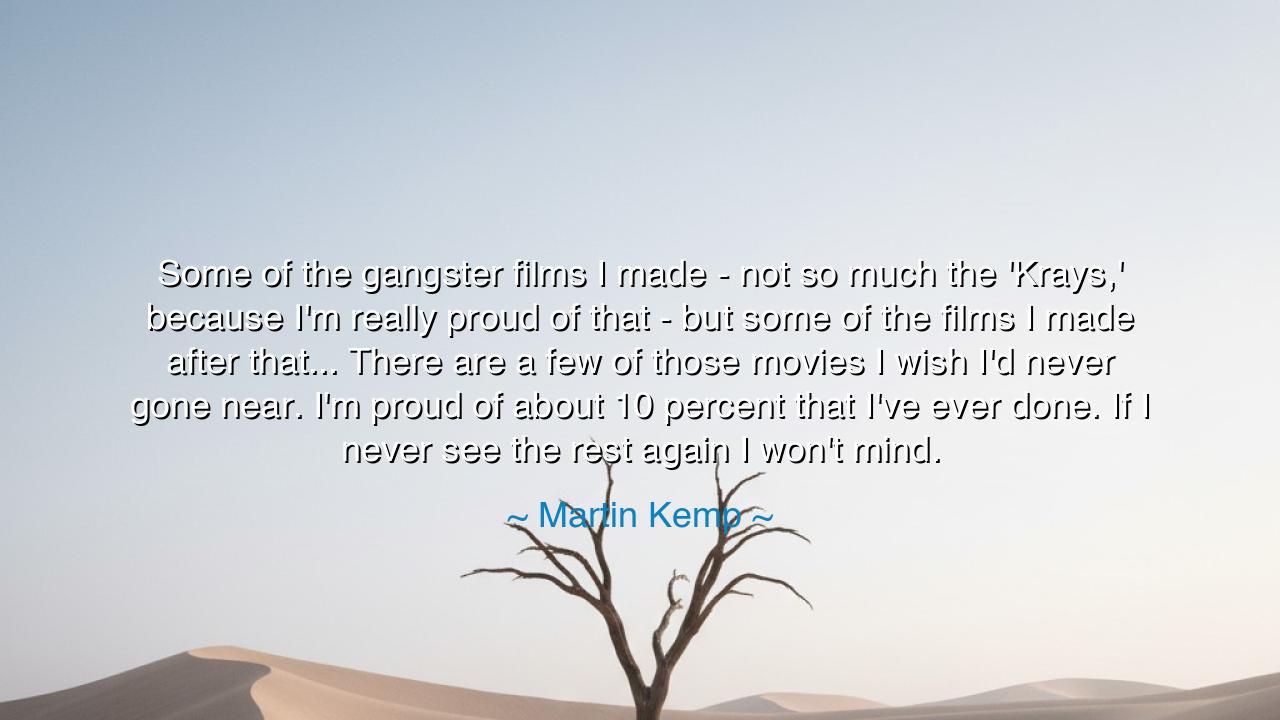
Some of the gangster films I made - not so much the 'Krays,'
Some of the gangster films I made - not so much the 'Krays,' because I'm really proud of that - but some of the films I made after that... There are a few of those movies I wish I'd never gone near. I'm proud of about 10 percent that I've ever done. If I never see the rest again I won't mind.






When Martin Kemp confessed, “Some of the gangster films I made—not so much the Krays, because I’m really proud of that—but some of the films I made after that... There are a few of those movies I wish I’d never gone near. I’m proud of about 10 percent that I’ve ever done. If I never see the rest again I won’t mind,” he was giving voice to a truth that echoes in the hearts of all who create, labor, and strive. His words reveal the weight of regret, the struggle with imperfection, and the rare jewels of pride that gleam amidst the dust of compromise.
The artist, like the craftsman of old, does not always labor under perfect conditions. There are moments when necessity, circumstance, or temptation lead him to work on things unworthy of his spirit. Kemp, who shone brightly in The Krays—a film that carried the raw energy of truth and performance—knew the taste of achievement. But he also knew the bitterness of looking back upon creations that failed to carry his soul. His honesty is not self-pity, but wisdom: even those who rise to fame must admit that only a fragment of their work is what they would wish to leave as their true legacy.
History itself teaches us this same humility. Consider Leonardo da Vinci, whose notebooks reveal countless unfinished works. Though he painted The Last Supper and Mona Lisa, which endure as eternal treasures, he abandoned more projects than he completed. Did this diminish his greatness? No—for it reveals that even the most brilliant produce only a fraction that reaches perfection. Kemp’s confession echoes this: out of a lifetime’s labor, perhaps only a tenth stands as the work of true pride.
There is also in his words the lesson of regret, which is a universal companion of those who strive. To wish one had “never gone near” certain endeavors is to recognize the cost of choices made in haste, compromise, or error. Yet such regret, when faced with honesty, can also purify. It reminds us that not every road is worth walking, and that discernment is as important as effort. Kemp’s courage lies in admitting this openly, so that others may learn from his scars.
Yet, let us not overlook the light within his words. That small portion—the ten percent—is a source of enduring pride. In that fraction lies the soul of the artist, the work that sings with authenticity and stands apart from the forgettable rest. To be proud of even one creation is no small thing, for it means one has touched the eternal, even if only briefly. Better to have created a single work of truth than a hundred of emptiness.
The lesson, O seekers, is this: measure not your worth by the sheer volume of your labors, but by the depth of the few that truly endure. Regret what was false, but do not despair; cherish what was true, and let it shine. For life is not about perfect constancy, but about the striving that leads, at least at times, to greatness. To be proud of ten percent is to have given something lasting to the world—and that is more than many ever achieve.
Practical action lies in this: choose your labors carefully, and when possible, let your heart guide you more than fleeting gain. Accept that not all you do will endure, but strive nonetheless to make at least some of it worthy of your deepest pride. When regret arises, let it instruct you, not destroy you. When pride appears, let it remind you of what you are capable of. For in the end, as Kemp teaches, our legacies are not measured by the total of our works, but by the few shining fragments that carry our truest selves into eternity.






AAdministratorAdministrator
Welcome, honored guests. Please leave a comment, we will respond soon